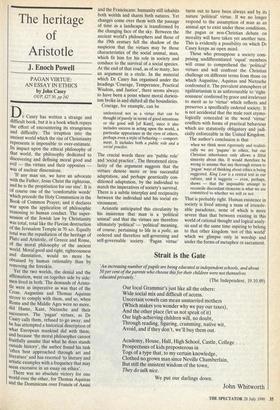The heritage of Aristotle
J. Enoch Powell
PAGAN VIRTUE: AN ESSAY IN ETHICS by John Casey
OUP, f27.50, pp 242
Dr• Casey has written a strange and difficult book, but it is a book which repays
the effort of encountering its strangeness and difficulty. The irruption into the ancient world which the rise of Christianity represents is impossible to over-estimate. Its impact upon the ethical philosophy of that world, the philosophy dedicated to
discovering and defining moral good and evil -- the virtues and their opposites was of nuclear dimensions.
'If any man sin, we have an advocate with the Father, Jesus Christ the righteous,
and he is the propitiation for our sins'. It is of course one of the 'comfortable words' which precede the Holy Communion in the Book of Common Prayer; and it declares war upon the application of philosophic reasoning to human conduct. The super- session of the Jewish law by Christianity
was total, total like the Flavian destruction of the Jerusalem Temple in 70 AD. Equally
total was the repudiation of the heritage of Plato and Aristotle, of Greece and Rome, of the moral philosophy of the ancient world. Moral good and right, righteousness and damnation, would no more be obtained by human rationality than by removing the foreskin.
Yet the two worlds, the denial and the affirmation, went on together side by side: men lived in both. The demands of Aristo- tle were as imperative as was that of the Cross. Augustine and Thomas Aquinas strove to comply with them, and so, when Rome and the Middle Ages were no more, did Hume, Kant, Nietzsche and their successors. The 'pagan' virtues, as Dr Casey calls them, refused to go away; and he has attempted a historical description of what European mankind did with them; and because 'the moral philosopher cannot fruitfully assume that what he does stands outside history', the author found his task 'often best approached through art and literature' and has resorted 'to literary and artistic examples with a frequency that may seem excessive in an essay on ethics'. There was no absolute victory for one world over the other, for Thomas Aquinas and the Dominicans over Francis of Assisi and the Franciscans: humanity still inhabits both worlds and shares both natures. Yet changes come over them with the passage of time as a landscape is transformed by the changing face of the sky. Between the ancient world's philosophers and those of the 19th century fell the shadow of the suspicion that the virtues may be those characteristics of the social animal, man, which fit him for his role in society and conduce to the survival of a social species. At the end of that road, as of so many, lies an argument in a circle. In the material which Dr Casey has organised under the headings 'Courage, Temperance, Practical Wisdom, and Justice', there seems always to have been a point where moral darwin- ism broke in and shifted all the boundaries.
Courage, for example, can be
understood not as a virtue that can be thought of purely in terms of good intentions or the good will [of Kant], since it also includes success in acting upon the world, a particular appearance in the eyes of others, perhaps even a style of behaving — comport- ment. It includes both a public role and a social practice.
The crucial words there are 'public role' and 'social practice'. The threatened circu- larity of the argument suggests that the virtues denote more or less successful adaptation, and perhaps genetically con- ditioned adaptation, by the individual to match the imperatives of society's survival. There is a subtle interplay and reciprocity between the individual and his social en- vironment.
Aristotle anticipated this circularity by his insistence that man is a 'political animal' and that the virtues are therefore ultimately 'political' — 'political' meaning, of course, pertaining to life in a polls, an ordered and therefore self-governing and self-governable society. 'Pagan virtue'
turns out to have been always and by its nature 'political' virtue. If we no longer respond to the assumption of man as an animal apt to exist under these conditions, the pagan or non-Christian debate on morality will have taken yet another turn. This is evidently a possibility on which Dr Casey keeps an open mind.
Those who presuppose a society com- prising undifferentiated 'equal' members will cease to comprehend the 'political' virtues and will confront the Christian challenge on different terms from those on which Augustine, Aquinas and Nietzsche confronted it. The prevalent atmosphere of egalitarianism is as unfavourable to 'right- eousness' conferred by grace and irrelevant to merit as to 'virtue' which reflects and preserves a specifically ordered society. It is not accidental that the male root etymo- logically concealed in the word 'virtue' conflicts with forms of practical behaviour which are statutorily obligatory and judi- cially enforceable in the United Kingdom.
The author's conclusion is that
when we think most rigorously and realisti- cally we are 'pagans' in ethics, but our Christian inheritance only allows a fitful sincerity about this. It would therefore be wrong to assume that any thorough return to 'pagan' ways of thinking about ethics is being suggested. King Lear is a central text in our culture, and it suggests — even, perhaps, shows — that the impossible attempt to reconcile discordant elements is what we are committed to whether we will or not.
That is probably right. Human existence in society is lived among a mass of irresolv- able paradoxes, none of which is more severe than that between existing in this world of rational thought and logical analy- sis and at the same time aspiring to belong to that other kingdom 'not of this world' which we glimpse only in worship and under the forms of metaphor or sacrament.


















































 Previous page
Previous page